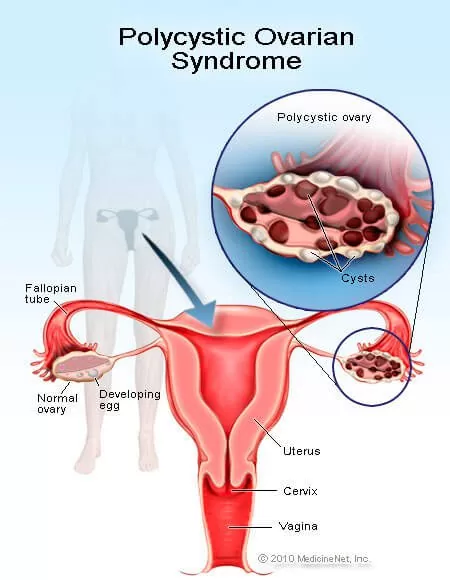PCOS Artava Kshaya
- Dosha Kapha ↑
Subtle Causes of PCOS Artava Kshaya
- Vayu
- Jala
- Prithvi
Guna Hetu | Attribute Causes
- Guru
- Manda
- Sheeta
- Drava
- Pichchila
Rasa Hetu | Taste Causes
- Madhura
- Amla
- Lavana
Imbalance of Dosha, Dhatu, Mala in PCOS Artava Kshaya
- Kapha ↑
Dhatu
- Rasa
- Rakta
Mala
- Mutra
Imbalance of Agni, Systems, Organs in PCOS Artava Kshaya
- Jatharangi Mandhya
- Rakta Dhatvagni Mandhya
- Rasa Dhatvagni Mandhya
Srotas | Systems
- Shukra
- Artava
Organs
- Garbhashaya
Vyadhi mode of PCOS Artava Kshaya
Santarpana
RAJVIDYA uploaded new photos

PCOS Artava Kshaya Defination
Polycystic ovarian syndrome (PCOS) is a hormonal disorder causing enlarged ovaries with small cysts on the outer edge
PCOS Artava Kshaya Description
PCOS is a medical condition in which multiple cysts form in the ovaries of a woman due to disruption in the normal menstrual cycle. In this disorder, enlargement of ovaries occurs which produce excessive amounts of androgen and estrogen. The hormonal imbalance interferes with the release of the eggs from the ovaries leading and causes irregular menstruation, weight gain, acne, etc.
Ayurvedic writings have mentioned Shukra Dhatu plays a key role in strengthening the health of the reproductive system. The efficiency of the Shukra Dhatu is affected due to imbalanced Doshas and leads to PCOS. Treating PCOS from the Ayurvedic approach involves herbs, diet patterns, therapies, natural remedies and a healthy lifestyle to cure it. The primary focus is to balance the hormones and boost fertility.
Polycystic ovary syndrome (PCOS) is a set of symptoms due to elevated androgens (male hormones) in females.
Signs and symptoms of PCOS include irregular or no menstrual periods, heavy periods, excess body and facial hair, acne, pelvic pain, difficulty getting pregnant, and patches of thick, darker, velvety skin.
Associated conditions include type 2 diabetes, obesity, obstructive sleep apnea, heart disease, mood disorders, and endometrial cancer.
Ayurveda classifies PCOS as a kapha disorder.
The organs responsible for reproduction in the female body are called artava dhatu. The channel that supplies, nourishes and enables the functional action of carrying the ovum to the uterus is called artavavaha srota. All three doshas play important and distinctive roles in the processes behind the female reproduction which includes the ovarian cycle and the menstrual cycle.
Vata is responsible for movement of the follicle during the ovarian cycle, the rupture of the ovary wall releasing the matured ovum, the movement of the fimbriae – the finger like projections that guide the ovum into the fallopian tubes and the movement of the ovum towards the uterus. These actions are due to apana vayu, the force behind downward movement from the navel down. Apana vayu is also responsible for the movement of menses during menstruation and the energy behind the downward movement of a baby through the birth canal during labour.
The action of the hormones expresses the nature of pitta, the energy responsible for transformation. All stages of the female reproductive process are a result of the interplay of hormones. The spark of intelligence behind the transformation of each stage is due to pitta reflected in the influence of the hormones on the different stages of the ovarian and menstrual cycles.
Kapha’s heavy cool qualities nourish the development of the tissues that form and support the reproductive system including the nurturing energy supporting growth of the follicle during the ovarian cycle. It is responsible for the mucosa layer of the fallopian tubes and uterus that protects the tissues from the drying affect of ever present vata. In the GI tract kapha is responsible for the mucosa lining that protects the tissues form digestive enzymes.
PCOS is due to kapha blocking vata and pitta, hence movement is obstructed and the transformation process is suppressed.
Food related causes PCOS Artava Kshaya
- According to Ayurveda, PCOS is believed to be caused by an imbalance in the doshas (vital energies), particularly Vata and Kapha.
- unhealthy dietary habits
Pathogenesis PCOS Artava Kshaya
According to Ayurvedic science, PCOS is caused due to an imbalance in Pitta (Fire) and Kapha (Water) doshas. When these doshas get aggravated, it leads to the toxification of the Dhatus (tissues) like Rasa (nutrient plasma) & Rakta (blood) and causes accumulation of ama (toxins) in the body.
In patients, suffering from Polycystic Ovary Syndrome (PCOS), the ama (toxins) get accumulated in the Manovahi Srotas (channels of the mind) and imbalances female hormones which are secreted by the pituitary glands of the body. This condition results in the formation of ovarian cysts, anovulatory periods and other PCOS symptoms.
Presymptoms of PCOS Artava Kshaya
PCOS in Ayurveda Artava Kshaya (Su. Sa. Sutra Sthana 15/12)
Symptoms
- Primary or secondary amenorrhoea (Yathochita Kala Adarshanam)
- Scanty menses / hypomenorrhea (Alpata)
- Dysmenorrhoea (Yoni Vedana)
Symptoms descriptions of PCOS Artava Kshaya
- Menstrual irregularities
- Uterine disorders
- Infertility
- Obesity
- Acne
- Baldness
- Hair growth on face
- High cholesterol
- Hypothyroidism
- Insulin resistance
- mood swings
- fatigue
- sleep disturbances
Types of PCOS Artava Kshaya
- Insulin-resistant PCOS - high insulin levels in the body. ...
- Inflammatory PCOS. ...
- Post-pill PCOS. ...
- Adrenal PCOS.
Complications due to PCOS Artava Kshaya
Complications in PCOS If left untreated, PCOS can lead to various health complications, such as insulin resistance, type 2 diabetes, high cholesterol levels, high blood pressure, and cardiovascular diseases. It can also cause difficulties in getting pregnant (infertility) and may impact emotional well-being due to the psychological effects of the condition
Treatment of PCOS Artava Kshaya
Effective Ayurvedic Treatment For PCOS
The main aim of Ayurvedic treatment for PCOS is to detoxify the body, strengthen & revitalize the female reproductive system, regularize menstrual cycle and rectify the hormonal imbalance. Following are the Ayurvedic treatment that focuses on re-balancing the hormones & tissue nutrition, rectifying the imbalance of Dosha and boosting metabolism:

Panchakarma
Panchkarma therapies like Vamana, Virechana, Basti and Udvartana cleanses and detoxify the body to remove toxins through emesis or purgation. It helps in balancing hormones, boosts fertility and aids against weight loss.
Herbs
Ayurvedic treatment of PCOS involves a blend of powerful herbs to balance the level of hormones. These medicines are helpful against inflammation caused due to cysts in the ovaries. Herbs such as Shatavari, Shilajit, Vibhitaki, Karavellaka, Guduchi, Meshashringi, etc are prescribed by the Ayurvedic practitioner.
Drugs for PCOS Artava Kshaya
Formulas for PCOS Artava Kshaya
Panchakarma for PCOS Artava Kshaya
No Panchakarma Procedures available for this Vyadhi.
Invistigations in PCOS Artava Kshaya
Your health care provider might then recommend:
- Pelvic exam. During a pelvic exam, your provider can check your reproductive organs for masses, growths or other changes.
- Blood tests. Blood tests can measure hormone levels. This testing can exclude possible causes of menstrual problems or androgen excess that mimic PCOS. You might have other blood testing, such as fasting cholesterol and triglyceride levels. A glucose tolerance test can measure your body's response to sugar (glucose).
- Ultrasound. An ultrasound can check the appearance of your ovaries and the thickness of the lining of your uterus. A wandlike device (transducer) is placed in your vagina. The transducer emits sound waves that are translated into images on a computer screen.
Shop Medicines Related to PCOS Artava Kshaya
No products found.